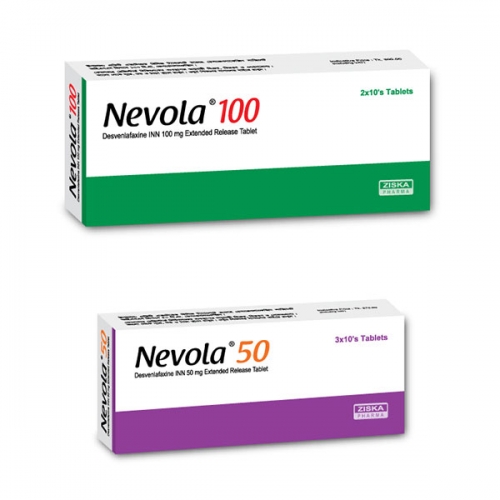ঔষধের বিস্তারিত বা বিকল্প ঔষধ জানতে ঔষধের নাম দিয়ে সার্চ দিন। যেমন- Napa বা Alatrol বা Amodis
Nevola 50mg
TabletDesvenlafaxine
Ziska Pharmaceuticals Limited
Other Strength:
- Nevola 100mg
Alternative:

Nevola
Presentation
Nevola® 50 mg tablet: Each Extended-Release tablet contains Desvenlafaxine Succinate INN equivalent to 50 mg of Desvenlafaxine.
Nevola® 100 mg tablet: Each Extended-Release tablet contains Desvenlafaxine Succinate INN equivalent to 100 mg of Desvenlafaxine.
Description
Nevola® (Desvenlafaxine) is a synthetic form of the isolated major active metabolite of Venlafaxine, and is categorized as a Serotonin-Norepinephrine Reuptake Inhibitor (SNRI). It works by blocking the transporter reuptake protein for key neurotransmitters affecting mood, thereby leaving more active neurotransmitters in the synapse. The neurotransmitters affected are Serotonin (5-hydroxytryptamine) and Norepinephrine (Noradrenaline). It is approximately 10 times more potent at inhibiting Serotonin uptake than Norepinephrine uptake.
MECHANISM OF ACTION
The exact mechanism of the antidepressive action of Desvenlafaxine is unknown, but is thought to be related to the potentiation of Serotonin and Norepinephrine in the central nervous system, through inhibition of their reuptake. Non-clinical studies have shown that Desvenlafaxine is a potent Serotonin and Norepinephrine Reuptake Inhibitor (SNRI).
PHARMACOKINETICS
The single-dose pharmacokinetics of Desvenlafaxine are linear and dose-proportional in a dose range of 50 to 400 mg/day. With once-daily dosing, steady-state plasma concentrations are achieved within approximately 4 to 5 days
Indications
Nevola® is indicated for the treatment of Major Depressive Disorder (MDD).
Dosage & Administration
The recommended dose for Nevola® (Desvenlafaxine Succinate) is 50 mg once daily, with or without food. In clinical studies, doses of 50-400 mg/day were shown to be effective. When discontinuing therapy, gradual dose reduction is recommended whenever possible to minimize discontinuation symptoms. Desvenlafaxine Succinate should be taken at approximately the same time each day. Tablets must be swallowed whole with fluid and not divided, crushed, chewed, or dissolved.
Side Effects
Nausea, dizziness, insomnia, hyperhidrosis, constipation, somnolence, decreased appetite, anxiety, dry mouth and specific male sexual function disorders
Precautions
Patients with Major Depressive Disorder (MDD) both adult and pediatric, may experience worsening of their depression and/or the emergence of suicidal ideation and behavior (suicidality) or unusual changes in behavior, whether they are taking antidepressant medications or not and this risk may persist until significant remission occurs. Pooled analysis of short-term placebo-controlled studies of antidepressant drugs (SSRIs and others) showed that these drugs increase the risk of suicidal thinking and behavior (suicidality) in children, adolescents and young adults (aged 18 to 24) with Major Depressive Disorder (MDD) and other psychiatric disorders. Short-term studies did not show an increase in the risk of suicidality with antidepressants compared to placebo in adults beyond age 24.
Contraindications
The use of MAOIs (Mono Amine Oxidase Inhibitors) intended to treat psychiatric disorders with Nevola® or within 7 days of stopping the treatment with Nevola® is contraindicated. The use of Nevola® within 14 days of stopping MAOI intended to treat psychiatric disorders is also contraindicated.
Use in Pregnancy & Lactation
Pregnancy Category 'C'. Nevola® should be used during pregnancy only if the potential benefits justify the potential risks to the fetus. Desvenlafaxine (O-desmethylvenlafaxine) is excreted in human milk. Because of the potential for serious adverse reactions in nursing infants from Nevola® a decision should be made whether to discontinue nursing or to discontinue the drug, taking into account the importance of the drug to the mother.
Commercial Packaging
Nevola® 50 mg tablet: Each box containing 3x10's tablets in Alu-Alu blister pack.
Nevola® 100 mg tablet: Each box containing 2x10's tablets in Alu-Alu blister pack.
Prescriber Information
USE IN SPECIFIC POPULATION
Dosage Adjustment in Renal Impairment: No dosage adjustment is necessary in patients with mild renal impairment. The recommended dose in patients with moderate renal impairment is 50 mg per day. The recommended dose in patients with severe renal impairment or End-Stage Renal Disease (ESRD) is maximum 50 mg every other day. Supplemental dose should not be given to patients after dialysis. The dose should not be escalated in patients with moderate or severe renal impairment or ESRD. Dosage Adjustment in Hepatic Impairment: The recommended dose in patients with hepatic impairment is 50 mg/day. Maximum 100 mg/day is not recommended.
Drug Interaction
Clinical studies have shown that Desvenlafaxine does not have a clinically relevant effect on CYP2D6 (e.g., Desipramine, Atomoxetine, Dextromethorphan, Metoprolol, Nebivolol, Perphenazine, Tolterodine) metabolism at the dose of 100 mg daily. Reduce the dose of these substrates by one-half if co-administered with 400 mg of Desvenlafaxine. Avoid use of Desvenlafaxine with other Desvenlafaxine-containing products or Venlafaxine products. The concomitant use of Desvenlafaxine with other Desvenlafaxine-containing products or Venlafaxine will increase Desvenlafaxine blood levels and increase dose-related adverse reactions. Like CNS-acting drugs, patients should be advised to avoid alcohol consumption while taking Nevola®.
এই পাতাটি ৩৪৪ বার দেখা হয়েছে
রাজডক কী?
ফ্রী সদস্য হোন Click Here
ডাক্তার হিসাবে যোগদান করতে Click Here
নার্স / টেকনোলজিস্ট হিসাবে যোগদান করতে Click Here
ফ্রী সদস্য হোন Click Here
ডাক্তার হিসাবে যোগদান করতে Click Here
নার্স / টেকনোলজিস্ট হিসাবে যোগদান করতে Click Here

